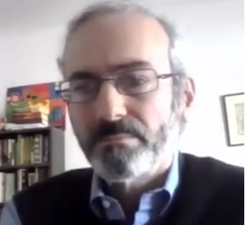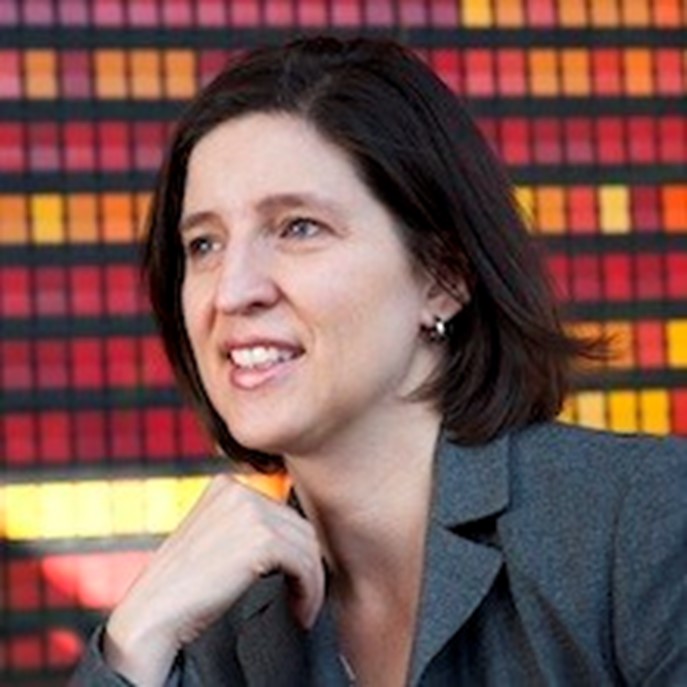
Paul Glasserman of Columbia University has won the 2020 IAQF/Northfield Financial Engineer of the Year (FEOY) award. The announcement was made February 8, but the customary annual dinner presentation was postponed until “it is safe to reconvene again,” the International Association for Quantitative Finance and Northfield Information Services said.
Glasserman, the Jack R. Anderson Professor of Business at Columbia Business School, is the latest in a line of FEOY honorees that began in 1993 with Robert Merton, a Columbia University graduate now at MIT Sloan School of Management who in 1997, with Myron Scholes, won the Nobel Memorial Prize in Economic Sciences. Scholes received a lifetime achievement award from the IAQF, formerly the International Association of Financial Engineers, in 2001.
The FEOY for 2019 was presented in New York a year ago to Cliff Asness, founder, managing principal and chief investment officer of AQR Capital Management. Francis Longstaff of the Anderson School of Business, University of California at Los Angeles, and Michael Brennan, an Anderson School emeritus professor, were FEOY in 2018 and 2017, respectively.
Another prestigious award in the quantitative field, the 14th CME Group-Mathematical Sciences Research Institute (MSRI) Innovative Quantitative Applications Prize, went in December to Susan Athey, Economics of Technology Professor at the Stanford Graduate School of Business. The prize is for the year 2019, and Athey is the first woman recipient. The late Stephen Ross of MIT Sloan won the inaugural CME-MSRI award, for 2006, 10 years after he was the FEOY.
Like the FEOY, the CME-MSRI roll includes Nobel laureates. The most recent, Stanford University economists Paul Milgrom and Robert Wilson, were the quantitative applications prize winners for 2017 and 2016, respectively, before receiving the economics Nobel in 2020.
“Integrating Theory and Practice”
The selection process for the FEOY, recognizing individual contributions to the advancement of quantitative finance, involves a nominating committee of about 100 people from all IAQF governing boards. Nominations are reviewed by a 25-member selection committee that includes the association's board of directors and senior fellows and was chaired by UCLA's Francis Longstaff.
“It's a great honor to join the distinguished list of past recipients,” said Glasserman, who joined the Columbia Business School in 1991 after three years with Bell Laboratories and is research director of the school's Program for Financial Studies. “It's a particular honor to be selected by a group that combines eminent practitioners and academics. This group embodies the ideal of integrating theory and practice.”

Northfield president Dan diBartolomeo called attention to Glasserman's “many contributions to our field” across academia, the private sector and government. “Often his work has been focused in areas of profound importance to the entire financial system.
“Paul has gained further prominence in recent years with the increasing interest in data science approaches to gaining insight into the complex workings of financial markets,” diBartolomeo continued. “We look forward to an award ceremony worthy of his outstanding accomplishments.”
Glasserman earned an AB degree in mathematics from Princeton University in 1984, and a PhD in applied mathematics from Harvard University in 1988. His book Monte Carlo Methods in Financial Engineering (Springer, 2004) received the 2006 Lanchester Prize and 2005 I-Sim Outstanding Publication Award. Other recognitions include the National Young Investigator Award from the National Science Foundation (1994-'99), IBM University Partnership Awards (1998-2001), the Wilmott Award for Cutting-Edge Research in Quantitative Finance (2004) and the IMS Medallion from the Institute of Mathematical Statistics (2006), and he received a U.S. patent for an option pricing method.
The Columbia professor had a fellowship from the Federal Deposit Insurance Corp. Center for Financial Research in 2004; took a leave in 2011-'12 to work at the U.S. Treasury's Office of Financial Research, then stayed on as a part-time consultant; and served on the Federal Reserve's Stress Testing Model Validation Council (2018-'20), the board of Moody's Investors Service (2015-'20) and the risk committee of the CME CDS clearinghouse (2013-'18).
For the Office of Financial Research (OFR), Glasserman contributed numerous working papers including a foundational overview, Forging Best Practices in Risk Management (2012), with Mark Flannery, David Mordecai and Cliff Rossi; and such other titles as Are the Federal Reserve's Stress Test Results Predictable?, Contagion in Financial Networks and Persistence and Procyclicality in Margin Requirements.
At an OFR-Federal Reserve Bank of Cleveland Financial Stability Conference in November, on a “Networks and Contagion” panel, Glasserman looked at the first quarter of 2020 as a “contagion stress test” that “for the most part we passed.” Specifically, regarding margin requirements for central clearing and liquidity stresses on mutual funds as “potential channels for contagion,” he said, “While we largely dodged the worst possible outcomes, it would be a mistake to think that this isn't an opportunity to fix some underlying problems.”
“Tech Economist”
Susan Athey has blended academic inquiry into auction-based marketplaces and internet economics with active tech-sector involvement: She was Microsoft Corp. consulting chief economist for six years and currently sits on the Expedia, LendingClub, Rover, Turo and Ripple boards of directors, as well as that of the non-profit Innovations for Poverty Action. She is also in the LP Advisors network of fintech venture capital firm Nyca Partners.

“The CME Group-MSRI Prize recognizes individuals who contribute original concepts in mathematical, statistical or computational methods for the study of markets' behavior and global economics,” the award sponsors said, noting that Athey distinguished herself “as one of the first 'tech economists.'” In addition to research on online advertising and the economics of the news media, “she has also studied dynamic mechanisms and games with incomplete information, comparative statics under uncertainty, and econometric methods for analyzing auction models.”
“It is a great honor to receive this prize, especially to join the company of some of my greatest heroes in economics - including one of my PhD advisers and recent Nobel laureate, Paul Milgrom,” said Athey, who was feted in a December 11 virtual event. “Throughout my career I've aspired to the ideals of this prize, and I've seen firsthand how mathematics and statistics can be powerful tools for both the theory and practice of analyzing and designing markets.”
Athey is one of the authors of a recently published quantitative study of declining living standards from the COVID-19 crisis in nine developing countries.
“Susan Athey's research, from the uses of machine learning in economics to the optimization of government expenditures on vaccines, has been at the leading edge of the field in economics," said David Eisenbud, director of MSRI and professor of mathematics at the University of California, Berkeley. "MSRI is proud to collaborate with CME Group to honor the importance of Professor Athey's work.”
“Her groundbreaking work in market design as it relates to business and economics has significant applications to our industry,” said Leo Melamed, CME Group chairman emeritus and founder of the CME Group-MSRI Prize.
Athey earned a BA in economics, computer science and mathematics from Duke University in 1991, and a PhD in economics from Stanford Graduate School of Business in 1995. She became a Stanford professor in 2013 after teaching at MIT, Stanford and Harvard. Athey won the 2007 John Bates Clark Medal as “that American economist under the age of 40 who is judged to have made the most significant contribution to economic thought and knowledge,” and the 2019 John von Neumann Award from Rajk LÁszlÓ College for Advanced Studies.
She serves as a long-term adviser to the British Columbia Ministry of Forests, designing and implementing its auction-based pricing system; is founding director of the Golub Capital Social Impact Lab at Stanford Graduate School of Business; and is associate director of the Stanford Institute for Human-Centered Artificial Intelligence.